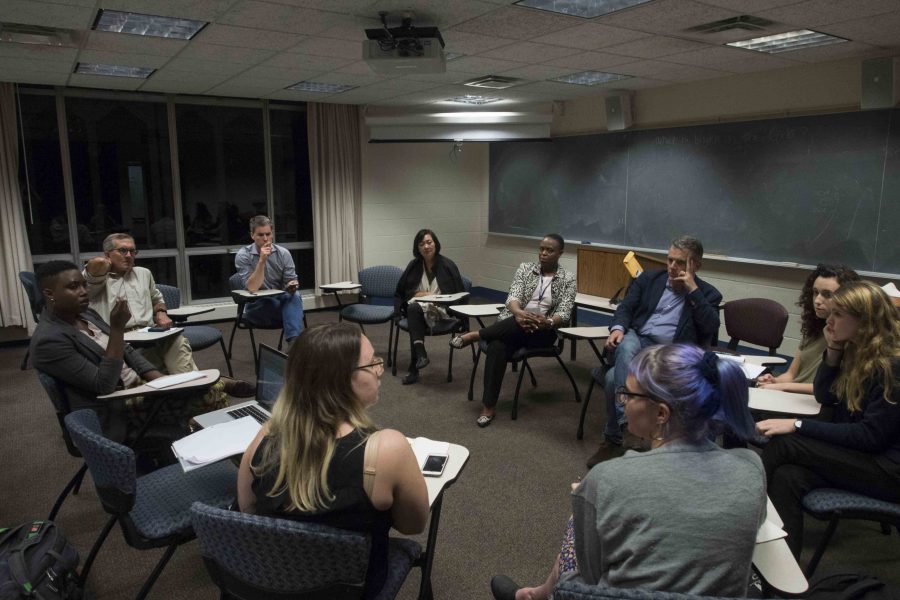Students Call for Representatives on Board
Trustees listen to student concerns about Title IX at the Trustee Forum on Thursday night in King. Student activists also raised the issue of adding student representatives to the board.
October 7, 2016
As the trustees conclude their first campus visit of the semester, student activists are fighting for a change to College governance: student representatives on the Board of Trustees.
Former Student Senate Liaison Jeremy Poe, who announced his resignation this morning, with the support of Student Senate and other student activists, published a letter requesting student representatives in May.
“In order to bridge the informational and political divide between the Board and students, Student Senate and I believe that the Board should welcome student representatives to its plenary meetings and to the Student Affairs Committee,” Poe wrote.
Under the current format, students are only able to directly address the Board through two means. The first is letters sent through snail-mail, as trustee emails are not published. The second is the trustee forums, which take place twice a year and feature students and trustees discussing issues in small groups.
Students have often complained about the unclear process involved in the Board’s decision-making, most recently in regards to last year’s decision to not divest from corporations that produce a large share of fossil fuels or participate in Israel’s occupation of Palestinian territories. College sophomore and fossil fuels divestment team member Cecilia Wallace was dissatisfied with the Board’s explanation last fall, and thinks having student representatives would improve communication.
“We submitted two proposals last year and the Board of Trustees would write back saying, ‘We really agree that these are important issues, but we chose not to divest,’” Wallace said. “It was really frustrating to not know why. Having student reps on the board would make decisions like divestment and other activist pushes that involve decisions from the Board of Trustees a lot easier.”
Student Senators have voiced similar concerns, and some believe that having a student representative would assure that student input is heard. Student Senator and College junior Jesse Docter added that having student representatives could allow trustees to possibly avoid unpopular decisions before they are made.
“I think having a student rep would allow students to engage with the decision-making of the school in a different and more substantial way,” Docter said in an email to the Review. “By gaining access to the larger and longer-term governance discussions, student advocacy could become pro- active as opposed to reactive.”
Although Student Senators never reached an official consensus about what exactly student representation on the board would look like, many have ideas about what would be best for both students and the board.
“We would ideally like to see students voting on things that are going to be affecting them when it comes to financial decisions,” said Meg Parker, Student Senate associate liaison and College sophomore. “But we also fully understand that it’s four years when you’re here at Oberlin, so your experiences and the amount of time you can serve [are] going to be sometimes limited.”
According to multiple trustees, the Board has yet to look at the issue in depth.
“I think we’re still at a very early stage of discussing it, so I don’t think I’m ready to say something on that until we understand the issue better,” said Diane Yu, OC ’73 Board member and deputy to the president of NYU. “We’re looking at ways to strengthen student-trustee engagement, and we’re exploring different options. We’re still undertaking it as an exploration.”
Though having student representation on the Board of Trustees is fairly common at larger state schools, it is less so among private institutions. The Association of Governing Boards, to which Oberlin’s Board belongs, recommends not allowing students onto boards as voting members.
“AGB generally does not support the inclusion of students as voting board members because of the inherent conflict of interest created when a student serves on his or her own institution’s board,” the association says.
Despite this stance, other AGB schools, such as Howard University, Saint Mary’s College of Maryland and Cornell University have appointed students to their Board of Trustees.
Yamini Bhandari, a senior at Cornell University, serves as Cornell’s undergraduate student elected trustee. Bhandari was elected by the undergraduate and graduate students at Cornell, has full voting rights and is able to serve on committees within the Board, including the Presidential Search Committee — an issue Oberlin also has to contend with this year with President Marvin Krislov’s impending departure.
“It has been incredible being able to serve on the Board,” Bhandari said in an email to the Review. “I’ve had the opportunity to dis- cuss some of the most pressing issues the university is facing and be able to voice student opinions in those very critical discussions.”
While many acknowledge that there needs to be reform in how the board communicates with students, some question whether adding a student representative to the board is the best option. “I definitely think that there are alternatives,” Wallace said. “What I think is really important is to having an understanding as to how the Board of Trustees works and to have communication between students and the Board of Trustees. A board rep is a really nice and simple way to make that happen. But there are ways that I think could possibly work better, too, by connecting committees on The Board of Trustees to relevant student activist groups.”





















